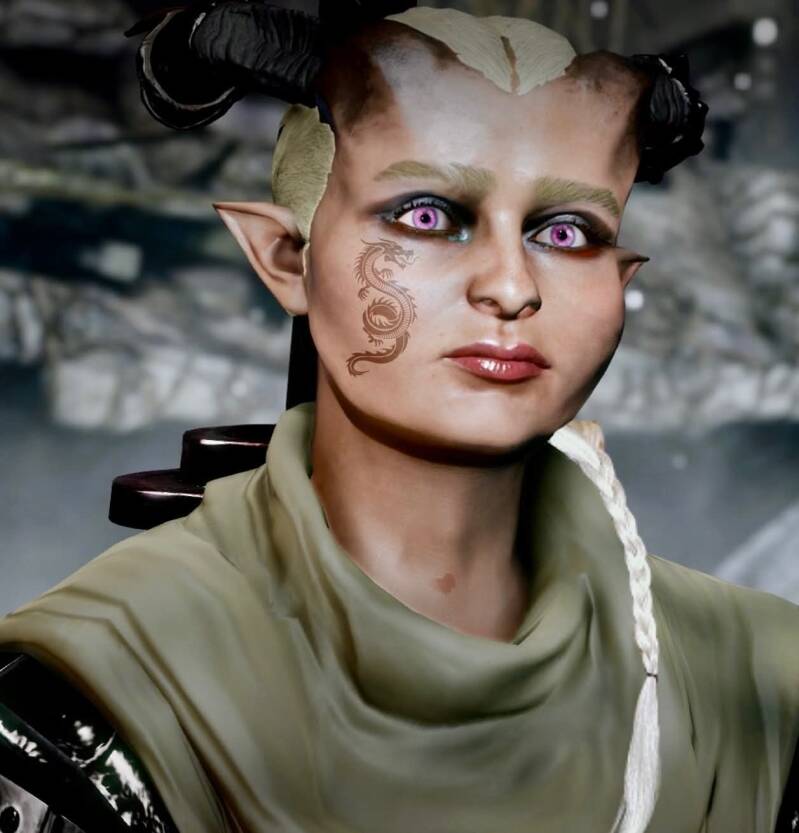
In the sprawling world of Dragon Age, few groups are as striking — or as misunderstood — as the Qunari. Towering warriors with silver skin, imposing horns, and a calm ruthlessness, they stride through Thedas like living monuments to discipline and ideology. But beneath the intimidating exterior lies something far more fascinating: a culture defined not by bloodline, but by belief — the Qun.
This post dives into the origins of the Qunari as written by BioWare, and the real-world myths and philosophies that likely inspired them.
Who Are the Qunari?
Despite appearances, the word “Qunari” doesn’t technically refer to a race — it refers to followers of the Qun, the rigid, all-encompassing philosophy that guides every aspect of life. Most Qunari we see in the games are from the race known as “kossith”, but to them, race is irrelevant. You are Qunari if you follow the Qun.
They don’t just have a government or a religion — they have a total worldview. Your role in society is predetermined based on your talents. Your personal desires? Irrelevant. The individual is subordinate to the whole.
The Qun: Not a Religion, but a Way of Being
The Qun is part military doctrine, part social contract, part spiritual code. It values order, stability, and the suppression of ego. Children are raised communally. Jobs are assigned. Even names are replaced with function-based titles like Sten, Arvaarad, or Tamassran.
This isn’t evil, per se — in fact, many Qunari believe the Qun is the only path to true peace and harmony. But to outsiders, it feels deeply authoritarian, even oppressive. There is no room for personal choice or ambition. You do what you’re meant to do, or you’re basalit-an — a broken wheel.

Mythological and Cultural Influences Behind the Qunari
BioWare has never officially confirmed all the inspirations behind the Qunari, but it’s easy to spot echoes of several real-world philosophies and civilizations in their creation:
🧘♂️ Stoicism and Eastern Philosophy
- The Qun emphasizes emotional control, duty, and the subjugation of personal desire — all core tenets of Stoicism and certain Buddhist philosophies.
- Much like Buddhist monks who abandon the self to reach enlightenment, Qunari abandon identity for harmony with the whole.
🛡️ Spartan Society
- Qunari society mirrors ancient Sparta: militarized, hierarchical, and centered on serving the state.
- Like Spartans, Qunari warriors are trained from childhood to be weapons — stripped of softness, forged in discipline.
🏯 Confucianism
- The rigid structure of the Qun — where every person has a place and virtue lies in fulfilling one’s role — echoes Confucian ideals of harmony through hierarchy and duty.
🔥 Zoroastrian Dualism (Good vs. Chaos)
- The Qun defines its worldview in moral binaries: order vs. chaos, unity vs. selfishness.
- In this way, it reflects Zoroastrian thought, which also portrayed the world as a battleground between opposing cosmic forces.
🐉 Islamic and Communist Influences (Socially/Politically)
- Some fans note parallels with Islamic theocracy or Marxist ideology, where society is ideally classless or spiritually united under a single vision — though the Qun pushes this to a far more extreme, almost dystopian level.
Qunari in Thedas: Feared, Respected, Hated
In Dragon Age: Inquisition, your Qunari Inquisitor is a walking contradiction to many in Thedas. Humans see Qunari as invaders. Elves see them as another empire. Dwarves view them warily. You are always the outsider. But your belief, your restraint, and your unshakable focus make you something Thedas rarely understands — a force of pure conviction.

Freedom or Function: The Qun’s Core Conflict
To many fans, the Qun poses the central philosophical question of Dragon Age:
Is it better to be free and flawed, or bound and whole?
Characters like Sten (Origins) and Iron Bull (Inquisition) represent both sides of the argument. Some find peace in the Qun. Others break under it. And your Inquisitor — especially as a Qunari — must decide whether to uphold its values or forge something new.
Final Thoughts
The Qunari are not just brutes with horns. They are BioWare’s way of asking us: What do we value — freedom or order? Individuality or unity? Their mythos is layered, drawn from multiple real-world systems of belief, and brought to life through some of the most intriguing characters in the franchise.
So whether your Qunari Inquisitor walks the path of the Qun or breaks it, one thing is certain — you were forged for purpose. The only question is: whose purpose will it be?
Add comment
Comments